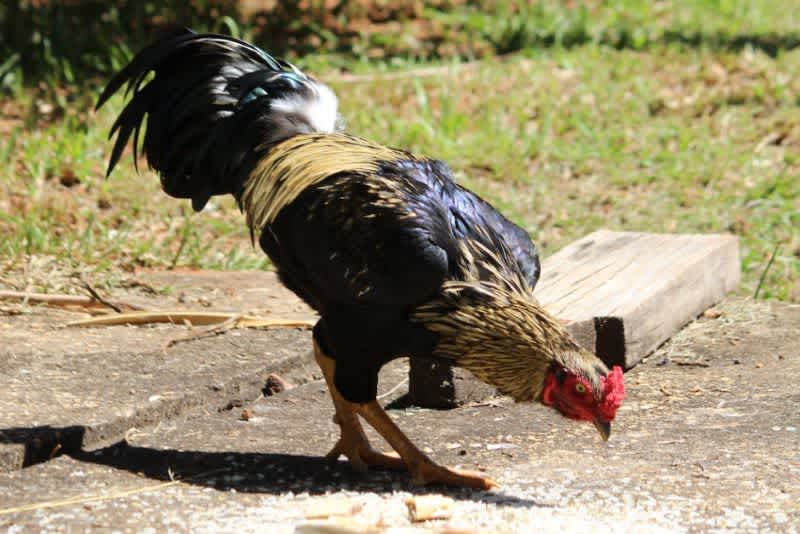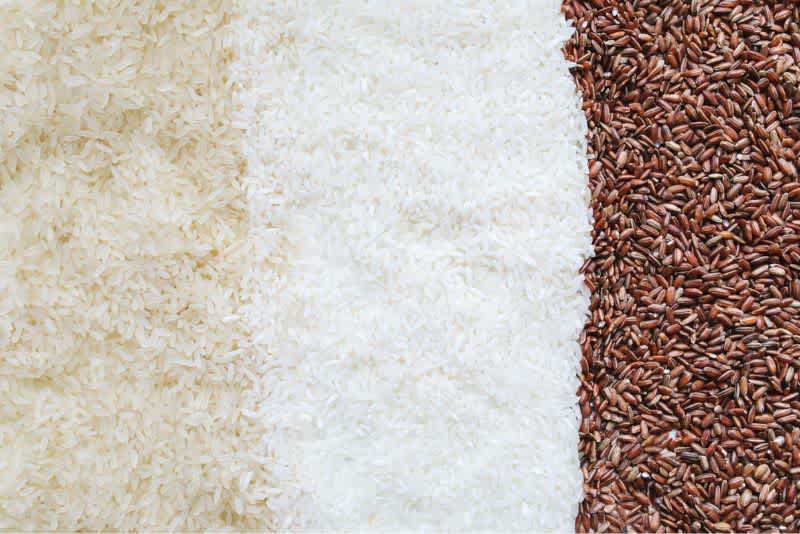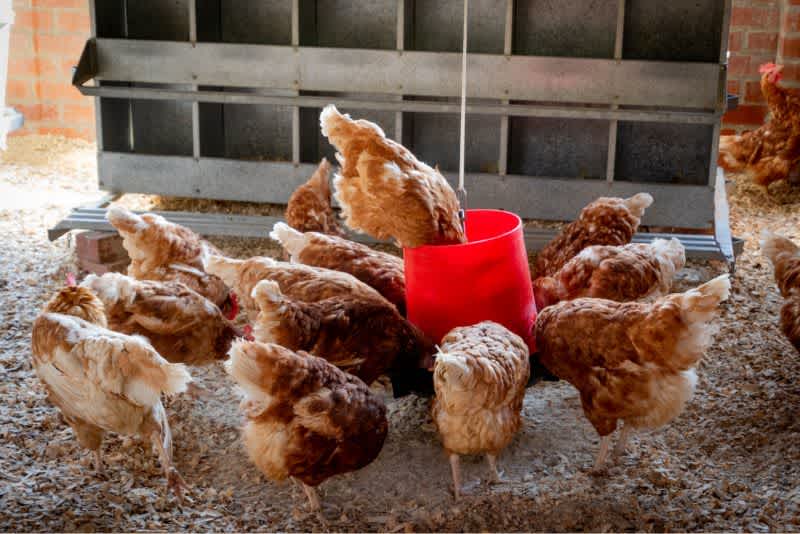Can Chickens Eat Rice? Top Things to Know (Benefits & Risks)
Published: September 30, 2023

As a farmer, you know that a well-balanced diet is crucial for the health of your flock. When it comes to feeding your chickens, you might wonder: can chickens eat rice?
Chickens are notorious scavengers, so knowing what goes into their beak is crucial for their well-being. And while rice is a common staple food in many households, it's crucial to understand how it affects your chickens.
In this article, we'll explore the top things you need to know about feeding rice to your feathered friends. So let's dive in and discover whether or not rice is a safe and nutritious option for your chickens.
Can Chickens Eat Rice?
If you're wondering whether or not chickens can eat rice, the answer is yes, they can! Just be sure to cook your rice before feeding it to your chickens.
Cooked rice is easier on a chicken’s digestive system and, therefore, better for your chicken’s health than if they eat raw uncooked rice.
It's a good idea to ensure that the cooked rice is not too hot when feeding it to your chickens, as this can cause burns in their mouth or crop. You can also mix cooked rice with other healthy foods, such as vegetables or fruits, to provide your chickens with a well-balanced and nutritious diet.
Despite being a staple food in more than 100 countries, cooked rice should still be fed in moderation as part of a well-balanced diet (10% of your chicken’s overall diet is plenty). It’s also important to avoid feeding chickens cooked rice seasoned with salt or other spices, as this can harm their health.
What Types of Rice Can Chickens Eat?

Chickens can eat various types of rice, including:
White rice (such as Basmati rice, Jasmine rice, Arborio rice, and Calrose rice)
Brown rice (such as long or short-grain brown rice, Basmati brown rice, Jasmine brown rice, and black rice)
Wild rice (such as Northern Wild Rice and Texas Wild Rice)
As with humans, it’s best if chickens eat brown rice or wild rice instead of plain white rice.
Brown and wild rice are more nutrient-dense than white rice, making them better for your chickens. Of the three types of rice, wild rice comes out on top as having the least fat, calories, and carbohydrates.
What Types of Rice Should Chickens Avoid Eating?

Here are some types of rice that your chickens would be better off avoiding:
Flavored rice mixes
Seasoned rice
Rice cereals, including Cocoa Krispies
Rice cakes
Rice Krispies Treats
Rice Pudding
Uncooked rice
Chickens should avoid these foods because these rice products often contain added sugars, artificial flavors, and preservatives that can harm their health. Rice cakes, Rice Krispies Treats, and rice pudding are often high in calories and low in nutrients, which can contribute to obesity and other health problems in chickens if consumed in excess.
It's important to provide chickens with a well-balanced diet that includes a variety of healthy foods such as vegetables, fruits, insects, and worms to ensure their optimal health and well-being.
Many sources say it’s fine if your chickens eat raw rice, but it’s better off avoiding feeding uncooked rice to your chickens altogether. When chickens eat uncooked rice, it can potentially cause digestive problems for chickens, especially if they are eaten in high quantities.
Here’s the main thing to remember: If it’s bad for you, it’s bad for your chickens too. You’ll want to avoid overly sugary and salty foods, which can cause obesity, diabetes, and other health issues for your chickens.
Can Baby Chickens Eat Rice?

Baby chicks should not be fed rice until they are six months old. While rice can be a healthy addition to a mature chicken's diet, it is unsuitable for young chickens as it can cause digestive problems and crop impaction.
Additionally, baby chickens require a diet high in protein and other nutrients to support their growth and development. It's best to provide them with a commercially available starter chick feed formulated to meet their nutritional needs.
Once chickens reach six months of age and get closer to becoming adult chickens, you can gradually introduce small amounts of cooked rice into their diet as a treat (as long as it's unseasoned and served in moderation).
What are the Benefits & Risks of Chickens Eating Rice?

Benefits of Rice for Chickens
Here are some of the main benefits of incorporating rice into a chicken’s diet:
High Nutritional Value
Improves Digestive System
Low in Fat
High Nutritional Value
Rice is highly nutritious due to its high carbohydrate content and more than fifteen essential vitamins and minerals. Some of these include:
Folic acid
B vitamins (such as Niacin which is a “good carbohydrate” that turns food into energy)
Potassium
Magnesium
Selenium (for improved egg hatching)
Fiber
Iron
Zinc
Wild and brown rice, in particular, are considered more nutritious than white rice because they contain the bran and germ layers of the rice grain, which are rich in fiber, protein, and essential vitamins and minerals.
Wild rice, in particular, is better than brown rice and is considered a superfood. It’s a good source of antioxidants and anti-inflammatory compounds that can help to protect against chronic diseases such as cancer, diabetes, and heart disease.
Improves Digestive System
Rice, especially brown and wild rice, contains vitamin B1, known as thiamin, which regulates chickens' digestive system.
Thiamin is essential for the metabolism of carbohydrates, a primary source of energy for chickens. It also helps to regulate the appetite and supports healthy digestion.
As long as rice is fed in moderation to chickens, rice can help improve their digestive system.
Low in Fat
Rice is a naturally low-fat food, which makes it a healthy food option for chickens. Excessive fat consumption can lead to obesity and other health problems in chickens.
Risks of Rice for Chickens
While rice can be a healthy and nutritious addition to a chicken's diet, some risks should be considered.
Here are some of the main risks of incorporating rice into a chicken’s diet:
Harmful Ingredients in Seasoned/Flavored Rice
Diarrhea
Promotes Weight Gain
Harmful Ingredients in Seasoned/Flavored Rice
Seasoned rice, especially those containing high salt and sugar, can be risky for chickens.
Too much salt can lead to salt toxicity or hypernatremia, causing dehydration, increased thirst, and other health issues in chickens. Added sugar can cause chickens to become overweight, impacting their overall health and laying ability.
Therefore, it is best to avoid feeding seasoned rice to chickens and stick to plain, cooked rice as a safe and healthy food option.
Diarrhea
While rice can be a healthy addition to a chicken's diet and improve digestion, too much rice can cause diarrhea. This is because rice is high in carbohydrates and can disrupt the balance of bacteria in a chicken's gut.
Promotes Weight Gain
Rice is a carbohydrate-rich food, and while it can be a healthy addition to a chicken's diet in moderation, too much of it can promote weight gain. Excessive carbohydrate consumption can lead to excess fat storage, impacting a chicken's overall health and laying ability.
As a result, it's important to offer rice as part of a balanced diet that includes other nutrient-rich foods like fruits, vegetables, and protein sources to maintain a healthy weight in chickens.
How Much Rice Can Chickens Eat?

The rice chickens can eat depends on their overall diet and individual needs. Generally, rice should only make up a small portion of a chicken's diet and be offered in moderation alongside other nutrient-rich foods.
A good guideline is offering no more rice than 10% of a chicken's diet. Additionally, monitoring chickens' overall health and weight is important to adjust their diet accordingly.
Final Thoughts
In conclusion, rice can be a healthy addition to a chicken's diet when fed in moderation and prepared properly. It provides essential vitamins and minerals and can aid in digestion.
Avoid feeding chickens seasoned rice or excessive rice, as this can cause health problems you won’t want to deal with.
By following the guidelines outlined in this article, you can ensure that your feathered friends stay healthy and happy!
Frequently Asked Questions
What should you not feed chickens?
Here is a list of some common foods that should not be fed to chickens:
Raw green potatoes and the leaves ad plants of other nightshade vegetables.
Avocado pits and skins contain persin, a toxin that can be fatal to chickens.
Chocolate and other foods containing caffeine or theobromine can cause heart problems and other health issues in chickens.
Uncooked rice and other grains, which can cause digestive problems.
Uncooked beans and other legumes contain lectins that can be toxic to chickens.
Spoiled or moldy food can contain harmful bacteria that can make chickens sick.
It's important to remember that while chickens are omnivores and can eat various foods, not all human foods are safe or appropriate.
When in doubt, it's always best to research before offering your chickens new foods and offer a balanced diet that meets their nutritional needs.
Can birds or chickens eat raw rice?
Yes, birds and chickens can technically eat raw rice, but it's not recommended due to its high level of indigestible starch, which can cause digestive problems.
What can I feed my chickens if I run out of chicken food?
If you run out of chicken feed, you can supplement their diet with kitchen scraps, fruits such as cherries, vegetables, grains, and seeds. However, avoiding giving them anything spoiled or containing salt, sugar, or caffeine is important.
Can chickens eat beans and rice?
Yes, you can feed chickens beans and rice, but make sure both are thoroughly cooked (especially the beans!)
Uncooked beans contain phytohaemagglutinin, which is highly toxic for chickens. You’ll also want to ensure the beans you feed your chickens do not come from a can, as they tend to have high sodium levels.
Is cooked rice OK for chickens?
Yes, cooked rice is safe for chickens and can be a nutritious addition to their diet. However, it should be fed in moderation and not make up most of their daily intake.
Keep track of all your cattle with the #1 Cattle Management Software
Try out Ranchr today for free